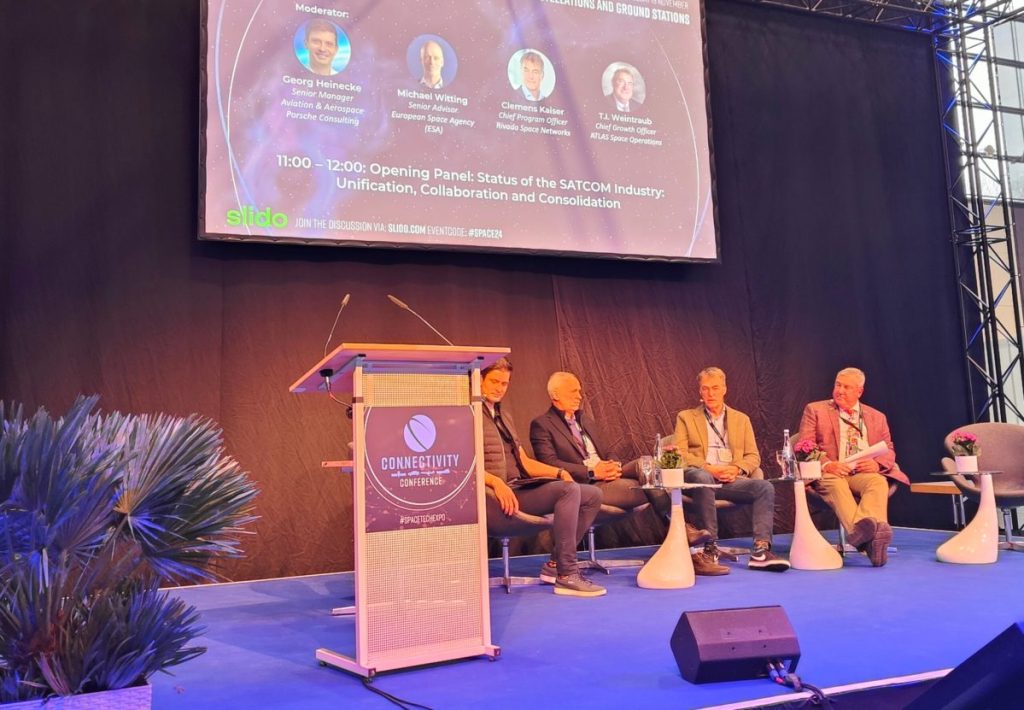BREMEN, Germany — Europe’s plan to launch a sovereign satellite communication constellation is moving ahead once more, but IRIS² faces challenges of timing, scale and feasibility in the face of competition.
IRIS² is intended to provide government, military and commercial communication services, emphasizing sovereignty, security, and independence, primarily funded by European sources and including public-private partnerships. But the system could be “too little, too late,” according to a panel discussion at Space Tech Expo Europe in Bremen, Nov. 19.
The IRIS² project, or Infrastructure for Resilience, Interconnectivity and Security by Satellite, has been hit with delays and higher-than-anticipated costs. It is set to come online by 2030, but SpaceX already operates around 6,000 Starlink satellites and China’s own constellation plans are starting to get off the ground.
In contrast, the European Commission outlined plans Oct. 31 for a constellation of 290 satellites by 2030, with the project being led by the SpaceRISE consortium. Global services had earlier been planned for 2027, with satellites starting to go up in 2025.
Panelists for a discussion on the status of the satcom industry agreed that government and military use cases exist, but the commercial aspect will be challenging. There are big questions about whether IRIS² can compete in affordability and scale with private-sector constellations like Starlink.
“By the time IRIS² is on orbit in 2030, SpaceX will have 12,000 satellites,” said T.I. Weintraub, chief growth officer with ATLAS Space Operations. “So it’s an economy of scale. And if you’re looking for the private-public partnership, and at the end of the day, for the consumers to use the capability, SpaceX’s Starlink is going to be more affordable.”
“But for the military and for government, clearly it makes sense,” Weintraub added. “IRIS² is needed because you don’t want Elon Musk to be able to turn it off.”
While SpaceX and other private operators leverage economies of scale, rapid iteration, and direct-to-device innovations, Europe lags in scaling production and fostering risk-taking cultures, which hinders its competitiveness, the panelists agreed.
Trial and error drive innovation, according to Clemens Kaiser, chief program officer at Rivada Space Networks. Kaiser stated that Europe’s cautious approach delays progress and diminishes competitiveness. Meanwhile, U.S. firms tend to excel due to faster decision-making and better alignment between government and commercial sectors. Kaiser stated that In Silicon Valley, failing four times is accepted; the fifth venture succeeds. In Europe, failing once often means no second chance.
Europe also faces hurdles in standardizing satellite and ground systems, which slows down progress.
“I think the real crux and the real difficulty will be to make available user terminals, which can exploit these services at a cost, size, power, if you wish, that is affordable by end users,” said Michael Witting, senior advisor at the European Space Agency (ESA), referring to end users in the sense of private but also car and aviation users and beyond.
“IRIS² has the problem of too many stakeholders, customers, and they want everything in this,” said Kaiser. “And this may lead to further delays, if you’re not really narrowing it down to something which can be realized.”
Europe appears to need to somehow balance affordability, innovation and security, while heavily relying on private-public partnerships and a complex web of stakeholders. It apparently also needs to foster a more innovative, risk-tolerant culture.
While there is no doubt about the need for a secure, sovereign European system, panelists agreed, the economic and competitive landscape raises questions, particularly regarding affordability and scale of existing commercial solutions. Whether it can deliver on its promise will depend on Europe’s ability to overcome structural, cultural, and technological barriers.




